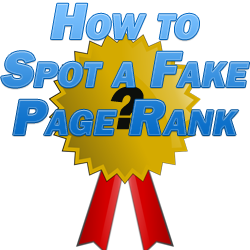Last week I discussed fake page rank, how blackhat SEOers do it, and why they do it. If you’re in the market for buying a website with the purpose of improving your ranking, taking over a site with a high existing page rank and linking or just redirecting to your site which you want to rank is a quick way to do that. But if you purchase a website under the assumption that you’re getting a high PR and it ends up being fake, you won’t be passing any worthwhile influence to your site and your rankings and PR will almost certainly stay the same. Therefore you must do your due diligence in differentiating between fake page rank sites and those with legit page rank numbers. There are a few ways of how to spot a fake page rank for a site you’re appraising.
How to Spot a Fake Page Rank
Backlinks – Take a look at the breadth and depth of the backlinks that site is currently receiving. I say currently because sometimes a site may have recently lost the influential links which led to that PR but if they no longer have them you can expect that PR to drop. It’s also just common sense that if a site has a high PR but no notable links coming in which have high PR themselves to explain it then it’s likely a fake.
Alexa Rank – Your Alexa rank (see how to increase your Alexa rank for more information) is a general ranking of authority for your site. Always check the Alexa rank for any site you’re looking at because if it’s got a high PR but it’s Alexa rank is suspiciously high then that should raise some red flags. Generally you can assume that a legit high PR site will receive a decent flow of traffic via good rankings and high profile links.
Domain Age – This one is pretty self explanatory but if a site just burst on to the scene in the last couple of months and already has a PR of 7, that’s highly questionable unless it came from the greatest website flipper alive. Conversely, if a site has been around for awhile, that’s a nice measure of trust which you can rely on at least in part.
Fake Page Rank Tools – There are plenty of tools out there to help you determine whether or not a site’s PR is legit or not. Most of them use the couple of major detectors I just covered. Expireddomains.net is a free service which is great for picking up on the latest domains for sale whether they’re expired or soon to be and they have effective tools for detecting legitimate or fake PR and you can even sort out your results based on that and loads of other parameters.
